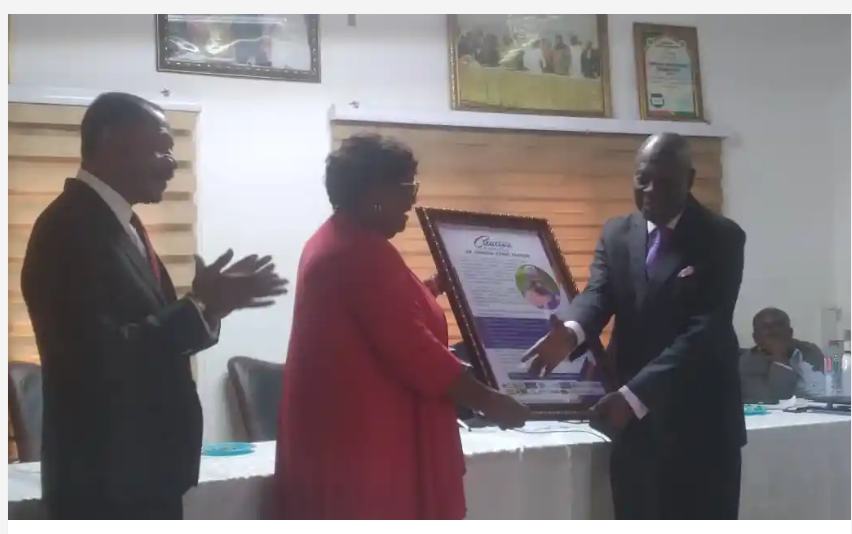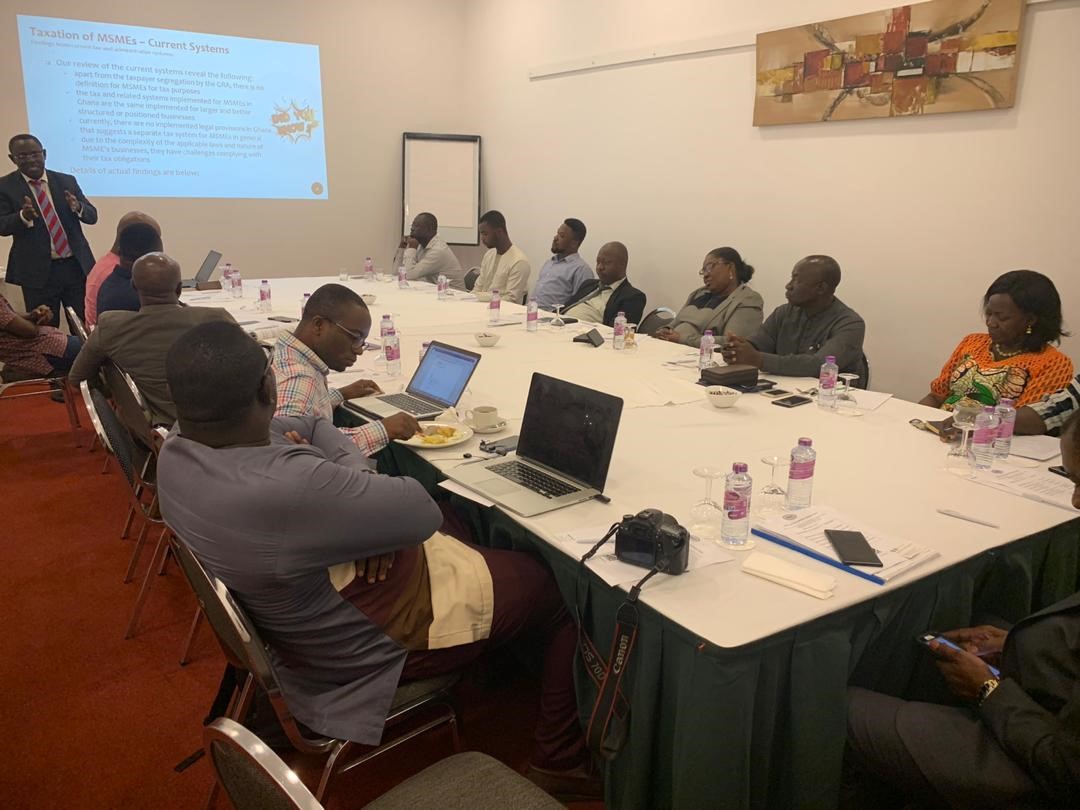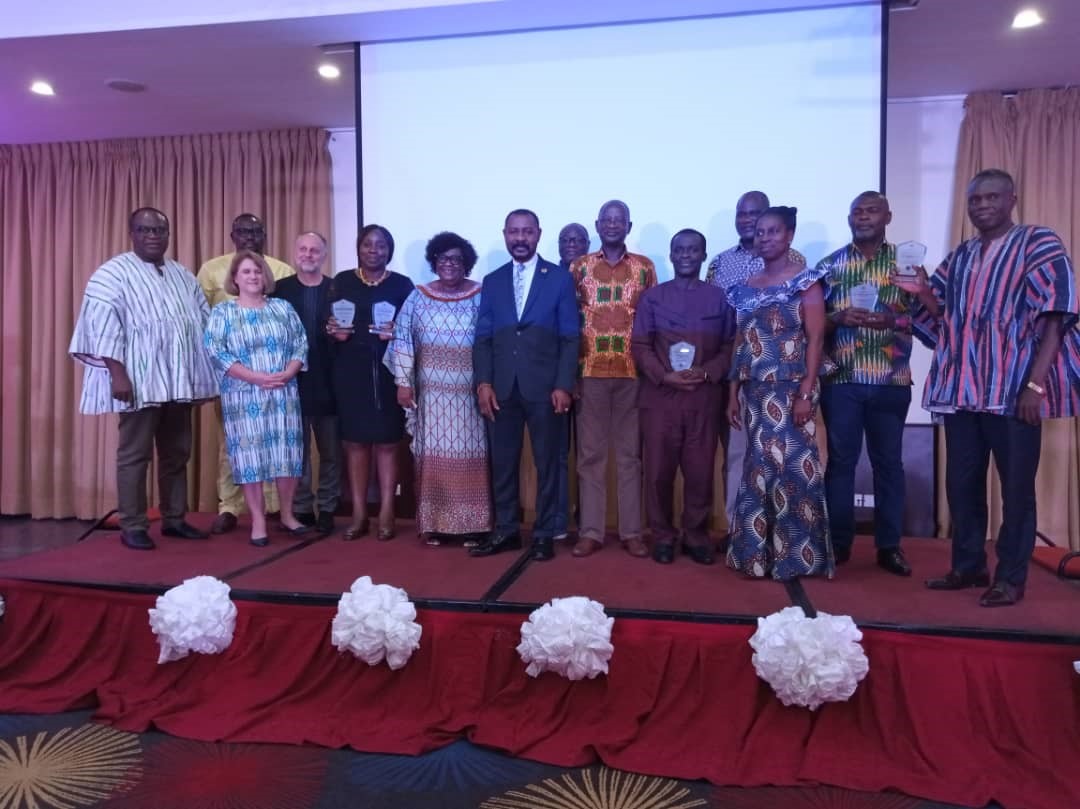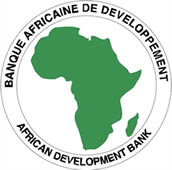PEF LAUNCHES REPORT ON TAX REFORMS IN GHANA

A cross-section of dignitaries at the launch
The Private Enterprise Federation (PEF) with support from the Open Society Initiative for West Africa (OSIWA), has carried out an in-depth research over the last 24 months to gather evidence on Ghana’s tax regime including findings and policy proposals for reform. On Wednesday 14th October, 2020, the report was launched to sensitize stakeholders on the findings and also announce the next stage of the project, which will be full scale evidence-based advocacy.
The research revealed that the country’s one size fits all approach to taxation of MSMEs was hostile to business growth and inhibits the ease of doing business in the country.
Presenting the report to the media, the Chief Executive Officer of the Federation, Nana Osei Bonsu, said a tiered tax system, which reduces the tax burden on businesses especially MSMEs, would encourage voluntary compliance and reduce the cost of tax administration in the country.
He noted that although the MSME sector formed about 92 per cent of the total registered companies in the country, they contributed only about four per cent to the total domestic revenue. He continued that was due to what he described as the one size fits all approach to taxation being implemented in the country, which made it difficult for the MSMEs to comply.
“Apart from small taxpayers threshold exemption from VAT, all MSME taxpayers are subject to the same Company Income Tax of 25 per cent of chargeable income. All MSME taxpayers are also subject to withholding tax on services, works and goods as well as company income tax just like large entities.
“There are no separate legal regimes for taxation of MSMEs. Therefore, the tax regime and the tax environment have a model of one size fits all. Further, the tax laws impose on MSMEs the same compliance obligations including tax calculation, payment and filing just as the large entities,” he explained.
He said this was not helpful for the country and the MSMEs because all the countries the research studied had clear definitions for SMEs in their tax laws.
Three taxpayer categories
The research proposed to the government to maintain the three-taxpayer categorisation which should include small taxpayer office (STO), Medium Taxpayer officer (MTO), and Large Taxpayer Office (LTO) but also needs to realistically define without any ambiguity, which entities should be classified as Micro, Small, Medium or Large taxpayers for purposes of taxation and related obligations; The current turnover threshold of GH¢200,000 for small taxpayers for income tax purposes is too low; rather the tax administration should consider Micro taxpayers as those with annual income of GH¢0 – GH¢90,000, Small taxpayers as those with annual income of GH¢90,001 – GH¢1 million and Medium taxpayers as those with annual income of GH¢1.1 million to GH¢5 million. The research also indicated that this system, when implemented especially at the SME level, should be very simple to understand and will have minimal costs to compliance.
GRA reforms
Nana Osei Bonsu pointed out that the success of the recommendations proposed in the study depended on the ability of the Ghana Revenue Authority (GRA) to reform its administrative system and embark on tax education and awareness creation in partnership with the business associations and other civil society groups.
“Issues about the segregation/categorisation of taxpayers are still outstanding and needs to be addressed to provide certainty for business planning and continuity. The scenario analysis provides good options for policy makers to choose from, considering their potential impact on tax revenue mobilisation.”
“The Private Enterprise Federation believes it is important for policy makers to consider a system which is in line with international best practice and also provides a good opportunity for the government to raise revenue as well as ease the compliance burden on businesses.”
On the basis of this report and prior engagements, the Federation is open for further discussions and engagement with policy makers on this subject,” he stated.
Impact on Government Revenues
A further analysis conducted show that if this system is well implemented it will lead to reduced compliance burden and tax administration cost and increased voluntary compliance and tax revenues. In the medium to long term the analysis shows an over 100 percent tax revenue increase compared to current rates.
The report further reveals interesting dynamics about the MSME sector in the country. Other dignitaries present at the launch was the Chairman of the Parliamentary select committee on Trade; Hon. Nana Marfo, the GIMPA rector; Prof. Bondzi Simpson, the Chairman of the GIPC; Mr. Kwesi Abeasi, the GRA Achimota STO commissioner; Mr. Augustine Abankwa and the lead research consultant Dr. Isaac Nyame.


 A cross-section of public and private stakeholders at the dialogue session
A cross-section of public and private stakeholders at the dialogue session 


































